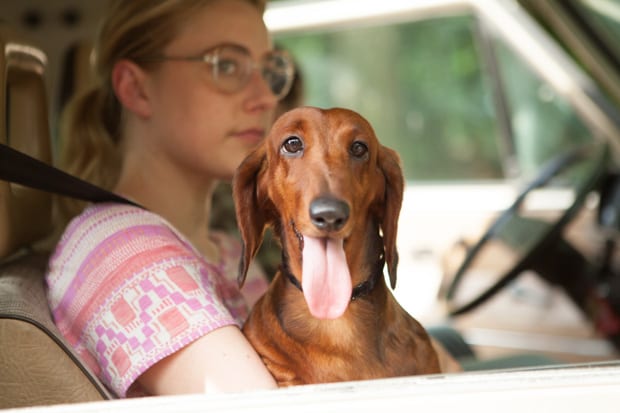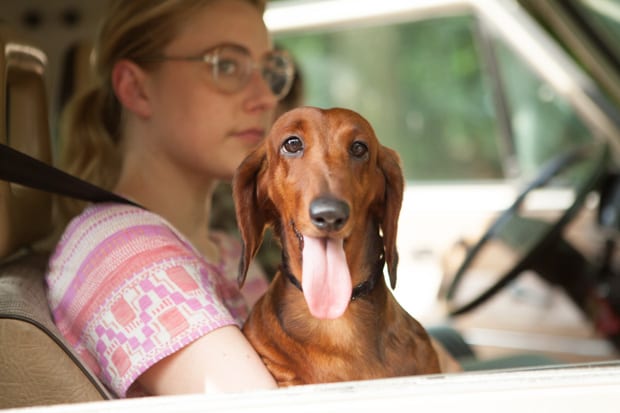Indie filmmaker Todd Solondz talks about revisiting Dawn Wiener in his hilariously twisted squirm comedy ‘Wiener-Dog’

BIZARRO BENJI | Greta Gerwig plays Dawn Wiener, one of the messed-up owners of a dachshund who travels the U.S. affecting human’s lives in Todd Solondz’s brilliantly twisted new film.
ARNOLD WAYNE JONES | Executive Editor
jones@dallasvoice.com
Todd Solondz is the undisputed master of squirm cinema: the kind of movies that make you feel uncomfortable for peculiar and oddly familiar reasons: Long, silent, disorienting shots; singularly unnerving conversations that cross a line of social decorum; and frank, desperate views of characters that border on pathetic.
 His breakout hit, 1995’s Welcome to the Dollhouse, introduced audiences to Dawn Wiener, the dim-witted, goofy and kinda unlikeable tween student whose attempts at social acceptance go disastrously wrong. Dawn is back in his latest film, Wiener-Dog (now playing at the Angelika Mockingbird), though this may come as a surprise to those who thought she had been killed off in Solondz’ 2004 film Palindromes (more on that later), or even those who wonder why she’s now played by Greta Gerwig instead of Dollhouse’s Heather Matarazzo (more on that later, too). And she’s not the title character in the movie, either — that laurel belongs to a slow, adorable female dachshund who unifies this collection of four short films.
His breakout hit, 1995’s Welcome to the Dollhouse, introduced audiences to Dawn Wiener, the dim-witted, goofy and kinda unlikeable tween student whose attempts at social acceptance go disastrously wrong. Dawn is back in his latest film, Wiener-Dog (now playing at the Angelika Mockingbird), though this may come as a surprise to those who thought she had been killed off in Solondz’ 2004 film Palindromes (more on that later), or even those who wonder why she’s now played by Greta Gerwig instead of Dollhouse’s Heather Matarazzo (more on that later, too). And she’s not the title character in the movie, either — that laurel belongs to a slow, adorable female dachshund who unifies this collection of four short films.“It is the life trajectory of this single dog, passing from owner to owner — it’s about a dog, but not really about a dog,” Solondz says in an accent that seems equal parts Long Island and recently-arrived German émigré. (Solondz was born in Newark, N.J.) “The dog is really a conceit — how owners look at their dogs and anthropomorphize them. They become vessels for the owners’ hopes and illusions — we project innocence and purity on them, so that when harm befalls them, it affects people with more keenness than were it to befall one of their fellow humans.”
The owners in Wiener-Dog include a young boy, in remission from cancer; the now-30-year-old Dawn Wiener; a frustrated film school professor (Danny DeVito); and a bitter woman (Ellen Burstyn) near the end of her life (who, disturbingly, has named the dog Cancer). Some of the owners’ lives are improved by the dog; some not so much; but all are transformed at various stages of their life cycles.
“Yes, it was built into the structure,” Solondz says of the metaphor of youth-adulthood-middle age-dotage. “The movie is really about mortality and how it shadows and hovers over each of these characters and stories.”
He even is able to resurrect a character of sorts in the personage of Dawn.
“We all have one life, but we always imagine the possibility of roads not taken,” he says. “That’s what I’ve been doing in my movies for a while. After I killed [Dawn off] in Palindromes, I wanted to offer her another possible life trajectory. This was an opportunity for me to do that.” Matarazzo had said she did not want to revive Dawn … which was just another opportunity for Solondz. “I think that’s one of the pleasures as a filmmaker — not only creating other lives but letting other [actors] live those other lives of characters.”
Solondz doesn’t blink in his fearless undercutting of expectations. He admits that the opening shot — an overhead of a young actor lying in the grass — is an homage to Texas filmmaker Richard Linklater’s Boyhood … though with a much more subversive take.
“That was very deliberate,” he says. “But Boyhood is a very different. I have great respect for Richard Linklater, but I wanted to present a kind of alternative boyhood, so I told the boy [in the scene] to play dead. That was the [mood I wanted to create].”
It’s that perversity that has made Solondz a darling of indie film fans for 20 years … and probably also what has kept him from mainstream financial success. He makes films about outsiders — transgender people, societal “losers,” those with Down’s Syndrome and more — and doesn’t prettify their lives one bit.
“I like to play, but not everyone likes to play with me,” he drolly opines. “I think whenever I go to the movies I look to be surprised. [I like] to have my expectations subverted and provoked in ways I hadn’t anticipated. Art can be transformative. I’m serious about what I do. They are sorrowful and sad, but they are comedies. I guess [you could call Wiener-Dog] a comedy of despair.”
One of the comedic set-pieces in Wiener-Dog is when, half-way through this 90 minute film, Solondz delivers an “intermission” complete with C&W ballad by Marc Shaiman and Scott Witman while audiences are encouraged to “visit your concession stand.” Yet another homage … this time to Quentin Tarantino?
“I hadn’t been thinking so much about Tarantino, but there’s nor reason he should have a monopoly on playing with the intermission,” Solondz says. “Because it’s such a small movie, I wanted to give it a sense of expansiveness — a dog roaming the whole country looking for [his purpose].”
But Solondz does get that his humor is, irrefutably, all his, right? Take, for instance, a scene in which a boy’s mother (Julie Delpy) explains that spaying the dog is a “favor,” so she won’t be raped by an HIV-positive mongrel like her own puppy was. He gets that no one has as twisted of a take on the banalities of life as he does?
“I don’t know,” he says. “The funny thing about this, I suppose, is that I understand how things come across as odd or weird to others, but as I am writing them, they sound perfectly natural to me. It’s not an intellectual, but a creative process. I’ve always thought, if one day some alien creatures came to our planet and thought we [humans] were really cute and would make good pets, and to be good pets we would need to be neutered, would we call our alien owners our best friends?”
A creative process, indeed.
This article appeared in the Dallas Voice print edition July 1, 2016.
















